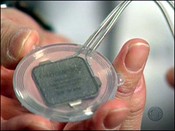VBLOC implant: Gastric bypass surgery alternative

Researchers believe that they might be able to combat obesity by blocking the nerve that helps regulate digestion, the vagus nerve.
An implantable device that uses electrical signals to block the vagus nerve, which helps regulate digestion, has shown early success in clinical trials. The experimental therapy, developed by Enteromedics, a medical-device company based in St. Paul, MN, is part of a growing trend to develop alternatives to gastric bypass surgery, an often highly successful but invasive procedure to curb obesity.
"We need an approach to this that is safer than current alternatives and efficient to perform," says Christopher Thompson, a surgeon at Brigham and Women's Hospital who tests new surgical tools and methods.
As the obesity epidemic booms, so has the number of people undergoing gastric bypass surgery, a procedure in which the stomach is surgically reduced to about the size of a lemon. The American Society for Metabolic and Bariatric Surgery estimates that gastric bypass rates have doubled in the United States in the past five years, from about 100,000 in 2003 to approximately 200,000 in 2007.
While gastric bypass often leads to dramatic weight loss, only a small percentage of people eligible for the surgery--those with a body mass index (BMI) of more than 35--actually choose to do it. That may be because the procedure comes with some serious risks and is irreversible, requiring permanent dietary restrictions and nutritional supplements. "Many people who really need the procedure don't seek out medical attention because they're worried about potential medical complications," says Thompson. "We're only treating a small fraction of eligible patients."
A new option is on the horizon. At a neurotechnology conference in Boston last week, Enteromedics described positive preliminary results from a European trial of its vagal blocking therapy, called VBLOC.
The device uses an electrical stimulator to block signals from the vagus nerve, which connects the brain to the gastrointestinal organs, regulating hormones and other factors involved in satiety and hunger. "It controls how the stomach expands when we start to eat," says Mark Knudson, chief executive officer at Enteromedics. "If it doesn't expand, we become full after a few bites."
In the procedure, two small electrodes are laparoscopically implanted next to vagal nerve fibers at the top of the stomach. A regulator implanted under the skin sends high-frequency pulses of electricity to the electrodes, which are thought to block the signals coming from the vagus nerve. While scientists don't know exactly how it works, they theorize that the device blocks signals that would normally tell the stomach to expand to accept food, as well as trigger the release of digestive enzymes and gastric acid, potentially slowing digestion. Many patients report feeling less hungry and feeling fuller earlier, says Knudson.
An analysis of nine patients who were among the first to receive the implant shows that they lost almost 30 percent of their excess body weight after nine months. And preliminary data from a larger group indicates that following the procedure, patients ate an average of 500 fewer calories per day. "That's less than you'd see for a lap band or a gastric bypass, but it's still pretty good," says Janey Pratt, a surgeon at Massachusetts General Hospital, in Boston. More >>
Labels: bariatric surgery, gastric bypass surgery alternatives, VBLOC implant, weight loss

0 Comments:
Post a Comment
<< Home